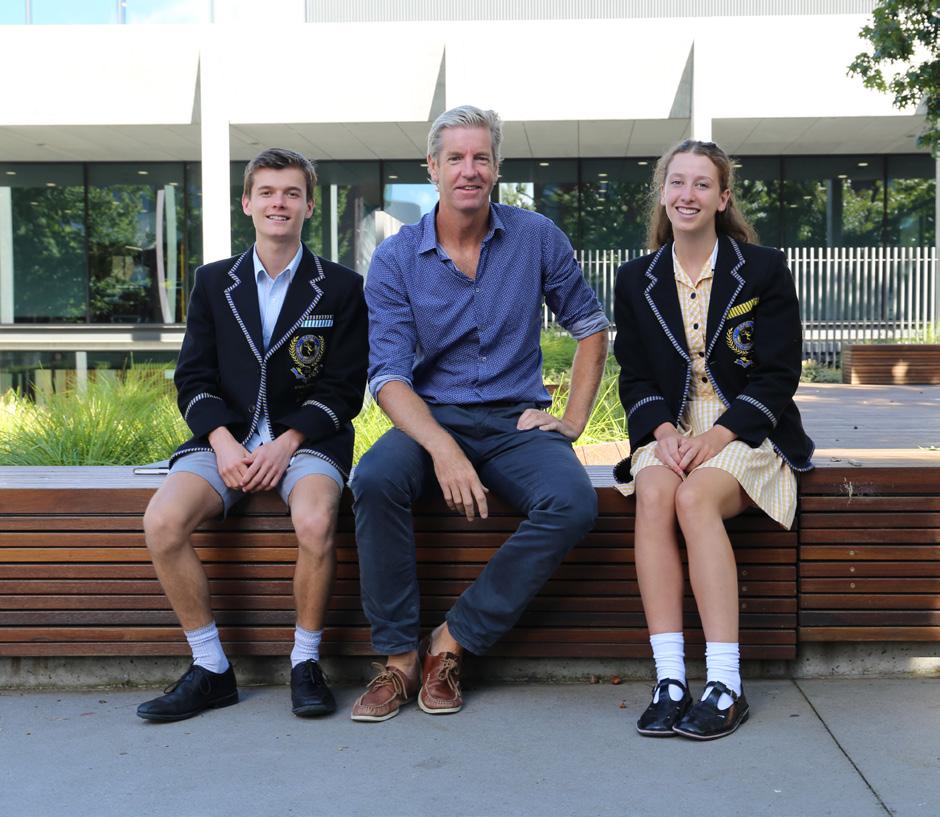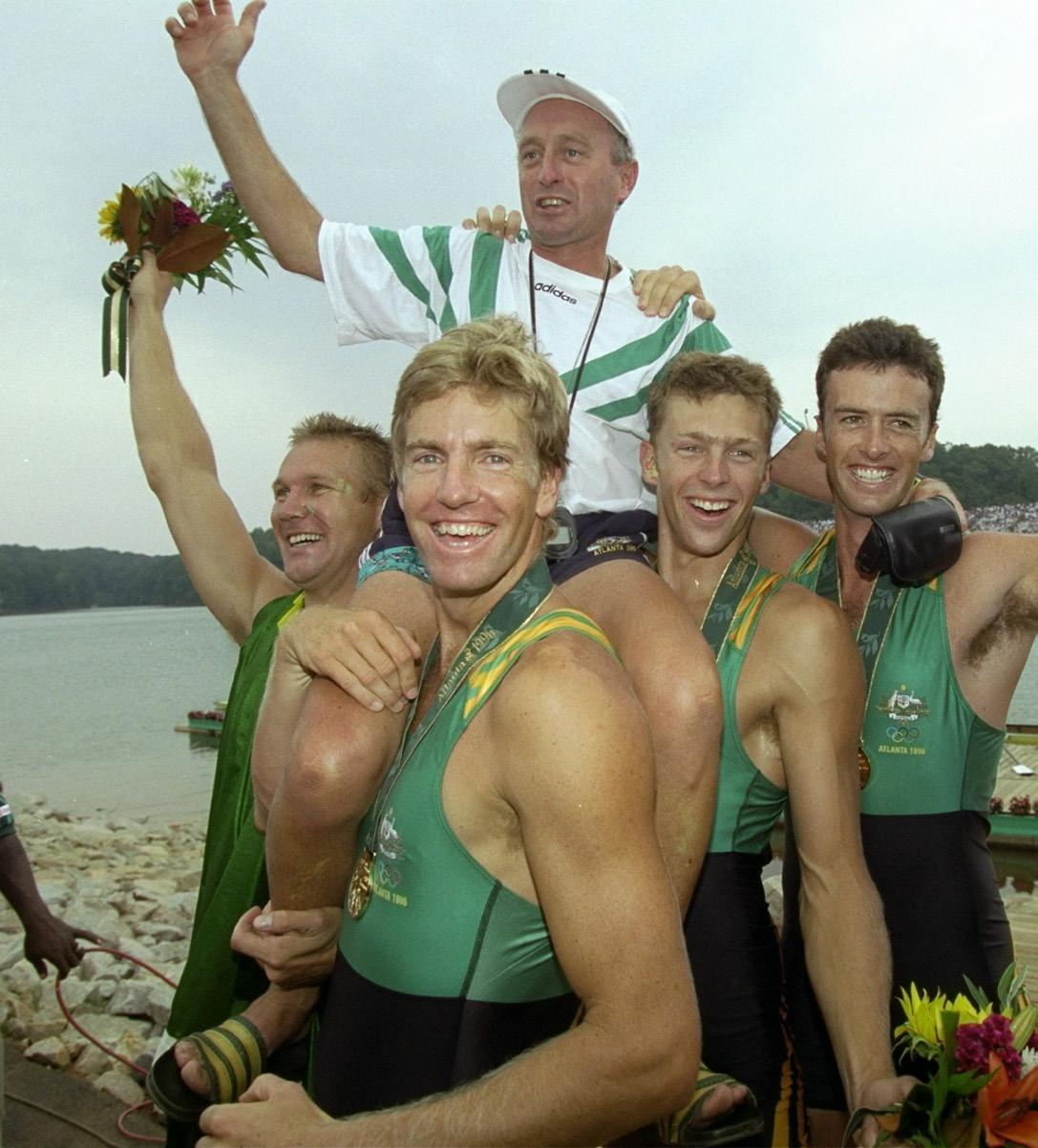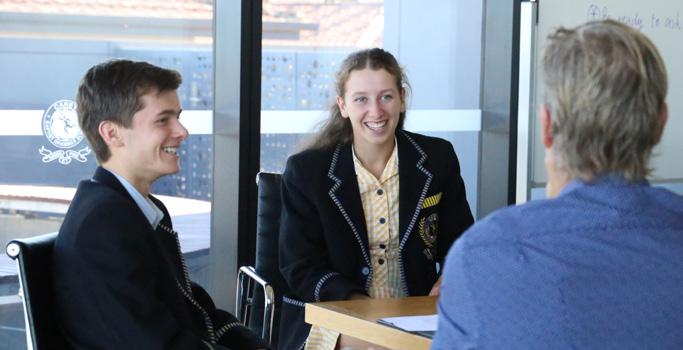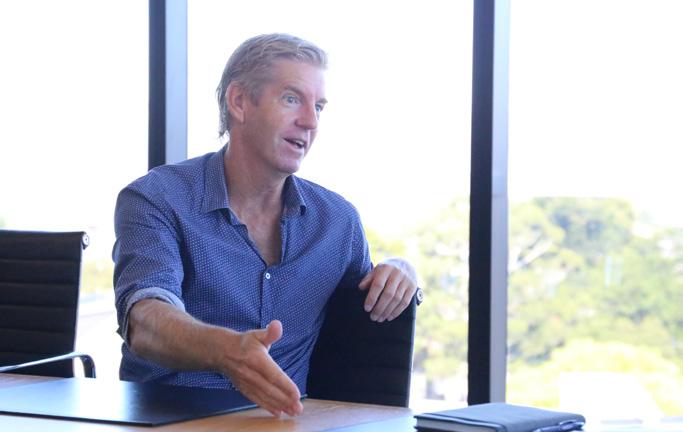
8 minute read
Find balance and embrace every opportunity
from Torch Winter 2022
by CareyGrammar
Sasha and Harrison, School Captains
Carey alum James Tomkins OAM OLY (1983) is a six-time Olympic rower, making him one of only four rowers worldwide to compete in this many Olympic Games. He is Australia‘s most decorated oarsman, having won three Olympic gold medals, seven World Championships and one Commonwealth Games gold medal, among many others. James was in the stroke seat – the important pacesetting seat at the stern of the boat – of the ‘Oarsome Foursome’. This crew was a coxless four, meaning there was no coxswain in the boat (the person usually responsible for navigation and steering) making the stroke position all the more important. The Oarsome Foursome rose to fame after winning gold in consecutive Olympic Games in 1992 and 1996.
Tomkins is now a father and successful businessman and remains connected with the Olympics through serving on the Australian Olympic Committee as well as being a part of the International Olympic Athletes‘ Commission. More locally, he assists and promotes the Firbank Grammar School rowing program.

27 July 1996: The Oarsome Foursome, James at the front, lifting coach Noel Donaldson after their gold-medal win at Lake Lanier at the 1996 Centennial Olympic Games in Atlanta, Georgia. L–R: Michael McKay, James Tomkins, Drew Ginn, Nick Green.
Ross Kinnaird/Allsport
Sasha: What was the biggest highlight of your time at Carey?
James: It would be all the friends that I made. I still catch up with them. I think when you do something meaningful with your friends and you’re aiming for a collective goal, you remember those experiences. I don‘t remember who I sat next to in science, but I remember who I sat in front of and behind in rowing. For me, the sport at Carey was a big thing – footy and rowing. My highlight would have been the friends I made through that.
Harrison: What were your interests at school?
James: My interests were sport, that was it. I didn‘t really appreciate the opportunities of going to a school like Carey while I was at school, but then as soon as you leave, you sort of do realise. But I certainly took advantage of any sport that I could do. I was good academically, but maybe I could have applied myself a little bit more to my academics. I just love being active and I loved lunchtimes, just playing.
Sasha: When did you realise that rowing was something that you wanted to pursue?
James: It was at school. Noel Donaldson was a PE teacher and a rowing coach at Carey. He was my coach in the First VIII Rowing in Year 11 and 12 and subsequently as my Olympic coach at the 1992 and 1996 Olympics. During this time, a friend I rowed with in school came up to me and said, ‘Dono reckons if you‘re not rowing for Australia in five years, there’s something wrong with you.’ That was the first time that it clicked that maybe I am pretty good at this and maybe I should pursue it.
Harrison: We know balance is an important thing for you. With school’s focus on academics, but then also having this passion for rowing, how did you compensate and find balance for this during school?
James: My balance was never 50/50. When I talk about balance, I mean that I think it‘s important to have a lot of things in your life. Just doing schoolwork is going to drive you crazy, and just doing sport, or the arts, or whatever it is, is going to drive you crazy. I think it‘s really important to have that balance with other things in life, to give you perspective. The notion of Olympism is to have a balanced life of mind, body and soul. At the games 2500 years ago, when they first started, they were all into that: academics for the mind, athletics for the body, arts for the soul. And when you died, the only way you went to the gods was if you had lived a balanced life. That‘s why I was able to continue my career for as long as I did, because I was studying eco-finance at uni and working while training and competing and doing everything else.
Sasha: How did you motivate yourself as stroke of the Oarsome Foursome?
James: I think the challenge was that I always felt huge responsibility in my position as stroke in the crew. I felt a lot of anxiety and tension. It took me a while to realise that we‘re all in this together, and we share that load. One of the other challenges was being a part of a small group of four guys who spent every minute together. When we were overseas, you‘re sharing a room, you‘re having every meal together and training with them every day for a couple of months. That management of each other and our emotions was a huge challenge. We had to learn how to understand each other.
Sasha: What would you say is one of the best displays of leadership that you have seen?
James: I think that fantastic leadership is seen in those who help everyone around them to perform at their best, and are completely selfless about it. One experience was with an awesome Romanian guy, our 1986 Olympic coach. Before the World Championships, racing in a crew of eight, we were all nervous and tense. He took us to a quiet place and said, ‘Listen, calm down. We’re all in this together. We‘ve all stuck to the plan, and win, lose or draw, we stick together.’ You could feel the tension just lift. He just wanted us to go out and do our best. It was one of those moments that sticks in your mind forever.


Harrison: As a significant leader to many as a coach for many years, how did you influence and lead your crews and athletes you were coaching at the time?
James: In a similar light – just having open conversations rather than dictatorship. It’s critical to make it enjoyable and have fun. It sounds easy even when you‘re working your butt off, but if you‘re not enjoying it, you‘re not going to be giving 100%. It’s like studying for Year 12 – if you work out a really good plan and you know it works, stick to it. Sure, you‘re going to deviate off sometimes, but then you need something to put you back on track. That was my philosophy, keep it enjoyable and make sure everyone understands what the plan is.
Harrison: What is your advice for Year 12s working towards exams?
James: Do the work early and set yourself up. Take away the option of a mad scramble to the finish line. Do the work early and you’ll find yourself being a couple of lengths in front of everyone else and you can just sail to the finish line.
Sasha: As a father, successful businessman and Olympic gold medallist, if you could give some advice to your past self when you were at Carey, what would it be?
James: My advice would be to make the most of every opportunity. In school it‘s all there on a platter for you. You don‘t know what you don‘t know. Although there may be angst and stress beforehand, just sign up and do it and dive into it as well. That’s actually one of the things I didn‘t do. I was really shy and a bit immature, so I didn‘t really embrace all the opportunities and I wish I had. But at least I did sport and I loved sport, and I’ve been really lucky to have had such cool experiences after school. I didn’t really know what I wanted to do with my life when I was at school, so if I didn’t do rowing I think my life would have gone in a very different direction. So you really have to embrace everything.

